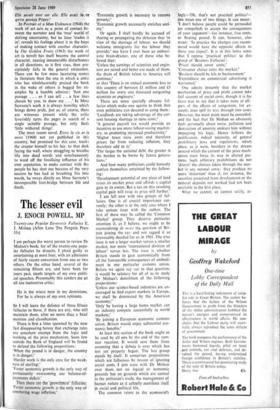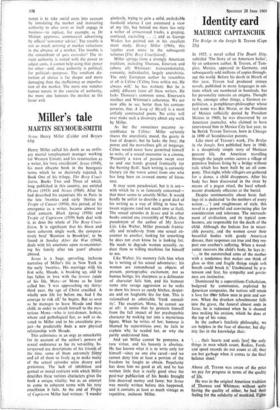The lesser evil
J. ENOCH POWELL, MP Twenty-one Popular Economic Fallacies E J. Mishan (Allen Lane The Penguin Press 35s) I am perhaps the worst person to review Dr Mishan's book; for of .the twenty-one popu- lar fallacies he dissects, I plead guilty to entertaining at most four, with an admission of fairly recent conversion from one or two others. On the other hand, several of the remaining fifteen are, and have been for years past, staple targets of my own politi- cal speeches. Presumably this renders me an all too inattentive critic:
He is the wisest man in my dominions; For he is always of my own opinions.
So I will leave the defence of those fifteen fallacies to those, if there are any, who still maintain them, after no more than a brief mention and classification.
There is first a litter spawned by the now fast disappearing heresy that exchange rates are somehow exempt from the logic and working of the price mechanism. Soon few outside the Bank of England will be found to defend the following propositions: 'When the pound is in danger, the country is in danger;'
'Harder work is the only cure for the weak- ness of sterling;' 'Faster economic growth is the only way of permanently overcoming our balance-of- payments deficit.'
Then there are the `growthman' 'Faster economic growth is the only way of combating wage inflation;' 'Economic growth is necessary to remove poverty;'
'Economic growth necessarily enriches soci- ety'
Or again, I shall hardly be accused of sharing or propagating the delusion that 'in view of the shortage of labour, we should welcome immigrants for the labour they provide;' nor have I ever been an enthusi- astic brain-drainer, one of those who be- lieved that:
'Unless the earnings of scientists and engin- eers are raised and better use made of them. the drain of British talent to America will continue;' or that 'There is an annual economic loss to this country of between £1 million and £3 million for every one thousand emigrating scientists or engineers' There are some specially obscene fal- lacies which make one squirm to think that even politicians can descend to using them: 'Landlords are taking advantage of the cur- rent housing shortage to raise rents;' 'A general payroll tax would provide an incentive to use more labour-saving machin- ery, so promoting increased productivity;' 'Higher taxes raise costs and therefore prices; far from reducing inflation, they therefore add to it;' The larger the national debt, the greater is the burden to be borne by future genera- tions.'
And how many politicians could honestly confess themselves untainted by the follow- ing: 'Development potential of any piece of land raises its market price and affords a capital gain to its owner. But a tax on this resulting capital gain will raise its price still further.'
I am left now with two groups of fal- lacies. One is of crucial importance cur- rently; the other is in the only area where I take serious issue with the author. The first of these may be called the 'Common Market' group. They deserve particular attention if, as I believe, we ought to be reconsidering de novo the question of Bri- tain joining the EEC and not regard it as irrevocably decided for us in 1961. The true issue is not a larger market versus a smaller market, nor more 'international division of labour' versus less. The issue is whether Britain stands to gain economically from all the foreseeable consequences of embodi- ment in one particular customs union. Before we again say oui to that question, it would be salutary for all of us to study Dr Mishan's demolition of the following propositions:
'Unless our science-based industries are en- couraged to find export markets in Europe, we shall be dominated by the American economy;' 'Only by having a large home market can an industry compete successfully in world markets;'
'By joining a European economic customs union, Britain would enjoy substantial eco- nomic benefits.'
At least this section of the book ought to be read by all MPS by the end of the sum-
mer vacation. It would save them from assuming that a debate is over which has not yet properly begun. The last group stands by itself. It comprises propositions which are fallacious by reason of ignoring social costs. I join issue with Dr Mishan
over them not on logical or economic grounds but on grounds which are central to the politician's trade, the management of human nature as it actually manifests itself in social and political life.
The common retort to the economist's
logic—'0h, that's not practical politics'— tian mean one of two things. It can mean: 'I don't believe people could be persuaded (or compelled) to accept the consequences of your argument'—for instance, free rents, or floating pound. It can, however, also mean: 'In practice the changes you recom- mend would have the opposite effects to those you expect'. It is in this latter sense that I oppose 'practical politics' to this group of 'Business Fallacies':
'Prices should cover costs;' 'Consumer choice rules the market;' 'Business should be left to businessmen;' 'Expenditure on commercial advertising is warranted.'
One admits instantly that the market mechanism of price and profit cannot take full account of social costs, though it is far from true to say that it takes none at all: part of the effects of congestion, for ex- ample, does spill its way through into costs. However, the main point must be conceded; and the fact that Dr Mishan so obviously feels personally about noise, pollution and destruction of amenity endears him without impugning his logic. Hence follows the justification, indeed necessity, of general prohibitory laws and regulations, which place, as jt were, boulders in the stream around which the current of the price mech- anism must force its way in altered pat- terns. Such arbitrary prohibitions do not 'distort' the choices taken through the mar- ket'in any normal sense: they produce no more 'distortion' than if, for instance, the coastline preserved from development or the mineral deposits not worked had not been available in the first place.
What we cannot, or cannot safely, at-
tempt is to take social costs into account by simulating the market and instructing authority to alter costs or itself engage in business—to replace, for example, as Dr Mishan approves, commercial advertising by official 'consumer advice'. The trouble is not so much arriving at market valuations in the absence of a market. The trouble is the conundrum of quis custodies? The in- stant authority is vested with the power to adjust costs, it cannot help using that power for other—and, since authority is political, for political—purposes. The resultant dis- tortion of choice is far deeper and more damaging than the inefficiency or imperfec- tion of the market. The more one watches human nature in the exercise of authority, the more one honours the market as the lesser evil.



































 Previous page
Previous page